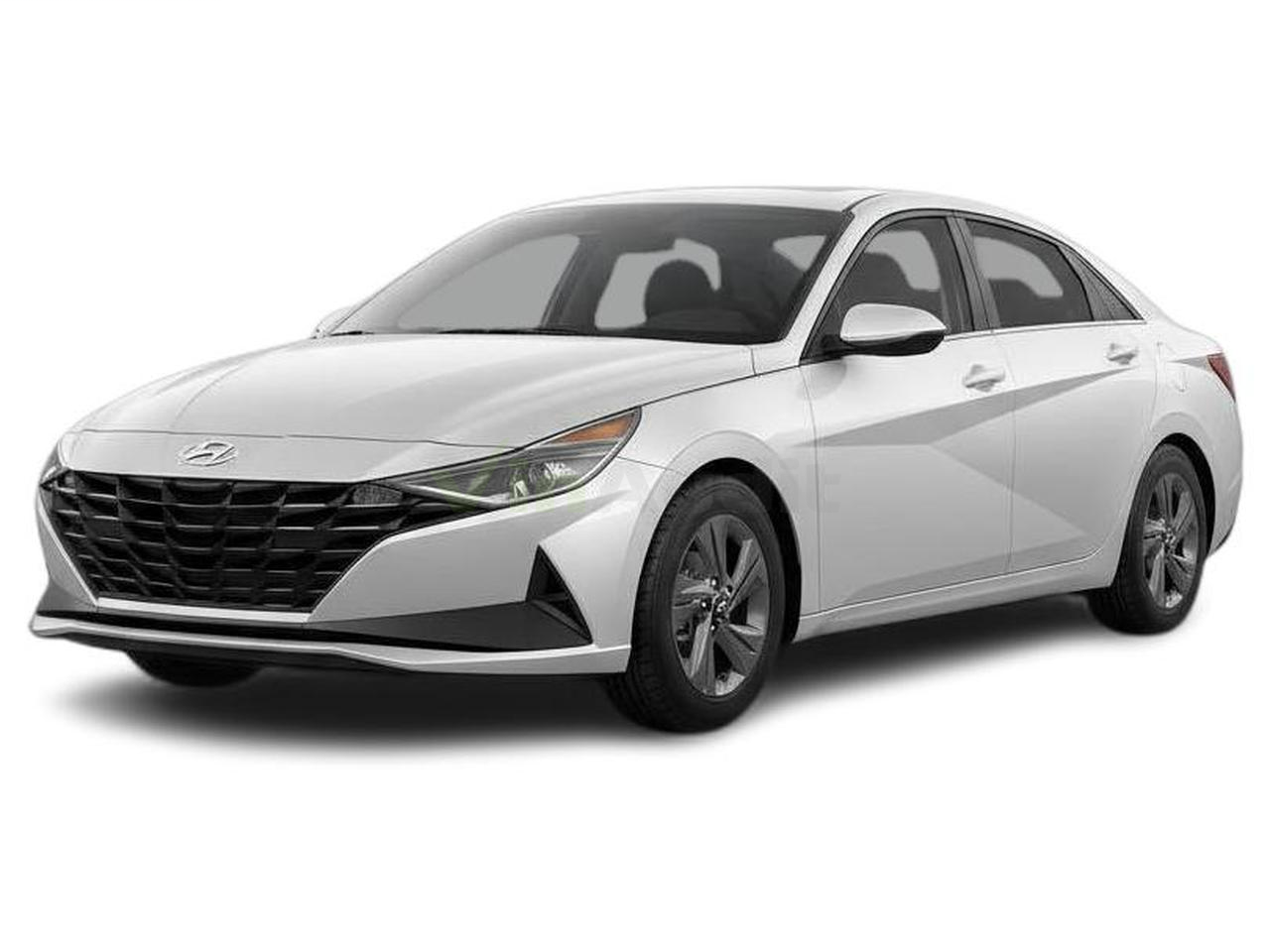The Good
The 2023 Elantra offers a suite of advantages: its striking, futuristic design appeals emotionally, while excellent fuel efficiency, especially the Hybrid, satisfies practical needs. Performance ranges from economical to exhilarating with the N Line and Elantra N. Hyundai's improving reliability and comprehensive warranty provide peace of mind. A comfortable, spacious cabin and strong value proposition, packed with technology, make it a smart, appealing choice for diverse buyers.
The Bad
Potential weaknesses for the 2023 Hyundai Elantra include the base 2.0L engine feeling underpowered for some, especially when merging onto highways. Road noise can be noticeable at higher speeds, and interior materials in lower trims, while functional, might feel less premium than some rivals. Its polarizing design isn't for everyone, and it lacks an all-wheel-drive option.
2023 Hyundai Elantra: Quick Overview
- Engine Options:
- 2.0L Smartstream G2.0 Atkinson Cycle I4 (SE, SEL, Limited)
- 1.6L Gamma II Turbo GDI I4 (N Line)
- 2.0L Theta II Turbo GDI I4 (Elantra N)
- 1.6L GDI I4 Hybrid with electric motor (Hybrid Blue, Hybrid Limited)
- Horsepower:
- 147 hp (2.0L I4)
- 201 hp (1.6L Turbo I4 - N Line)
- 276 hp (2.0L Turbo I4 - Elantra N)
- 139 hp combined (1.6L Hybrid)
- Fuel Economy (EPA Estimated City/Highway MPG):
- 2.0L I4: Up to 33/42 MPG (Automatic)
- 1.6L Turbo I4 (N Line): Up to 28/36 MPG (Automatic), 25/34 MPG (Manual)
- 2.0L Turbo I4 (Elantra N): Up to 20/30 MPG (Automatic), 22/31 MPG (Manual)
- 1.6L Hybrid: Up to 53/56 MPG (Blue trim), 49/52 MPG (Limited trim)
- 0-60 MPH Times (Approximate):
- 2.0L I4: 8.0-8.5 seconds
- 1.6L Turbo I4 (N Line): 7.0-7.5 seconds
- 2.0L Turbo I4 (Elantra N): 5.0-5.5 seconds
- 1.6L Hybrid: 9.0-9.5 seconds
- Towing Capacity:
- Not rated or recommended for towing.
- Key Trim-Level Features:
- SE: 8-inch touchscreen with wireless Apple CarPlay®/Android Auto™, 15-inch alloy wheels, Hyundai SmartSense safety features (Forward Collision-Avoidance Assist with Pedestrian Detection, Lane Keeping Assist, Driver Attention Warning).
- SEL: Builds on SE; adds 16-inch alloy wheels, push-button start, dual-zone automatic climate control, available Convenience Package (heated front seats, 10.25-inch digital gauge cluster, wireless charging).
- Limited: Elevates SEL; includes 17-inch alloy wheels, leather-trimmed seating, 10.25-inch touchscreen navigation (wired Apple CarPlay®/Android Auto™), Bose premium audio, enhanced driver assistance features (Blind-Spot Collision-Avoidance Assist, Smart Cruise Control).
- N Line: Sport-tuned suspension, 18-inch alloy wheels, unique N Line exterior and interior styling cues, sport seats, 1.6L turbocharged engine.
- N: High-performance model with 2.0L turbocharged engine, N-specific adaptive suspension, electronic limited-slip differential, larger brakes, sport exhaust, N Light sport bucket seats, 19-inch wheels.
- Hybrid: Features a dedicated hybrid powertrain, unique alloy wheel designs, specific gauge cluster graphics, and exceptional fuel economy across Blue and Limited variants.
2023 Hyundai Elantra Specifications
Vehicle Information
| Year | 2023 |
| Make | Hyundai |
| Model | Elantra |
| Trim | - |
| Style | - |
| Type | - |
| Category | - |
Manufacturing Details
| Made In | - |
| Manufacturing City | - |
Dimensions
| Doors | - |
| Curb Weight | - |
| Gross Vehicle Weight Rating | - |
| Overall Height | - |
| Overall Length | - |
| Overall Width | - |
| Wheelbase Length | - |
| Standard Seating | - |
Engine & Performance
| Engine | - |
| Engine Size | - |
| Engine Cylinders | - |
| Transmission | - |
| Transmission Type | - |
| Transmission Speeds | - |
| Drivetrain | - |
Additional Features
| Anti-Brake System | - |
| Steering Type | - |
Pricing
| Manufacturer Suggested Retail Price (MSRP) | - |
| Invoice Price | - |
| Delivery Charges | - |
Vehicle History Report
Specifications
History
Events
History Check
Check
Check
Check
Check
Listings
Recalls
Check
Analysis
What Problems Does the 2023 Hyundai Elantra Have?
Some owners have reported minor infotainment glitches, such as occasional screen freezing or connectivity issues with Apple CarPlay® or Android Auto™. These are typically software-related and often resolved with updates. There have been infrequent mentions of noticeable road or wind noise at highway speeds, a common characteristic in the compact segment, which can detract from cabin tranquility for some. For models equipped with the standard 2.0L engine, a feeling of being underpowered, particularly when accelerating from a stop or attempting overtakes, is sometimes noted, though this is more of a performance expectation issue rather than a mechanical problem.
Regarding recalls, 2023 models are new enough that significant widespread recalls are still developing. Hyundai, like all manufacturers, issues recalls for various components ranging from minor software updates to potential safety-related parts. Owners should always check the NHTSA website with their VIN for the most current recall information.
Looking at long-term reliability, Hyundai has made significant strides in recent years. The Elantra generally enjoys a good reputation for durability. The non-turbocharged 2.0L engine is a proven design known for its longevity with proper maintenance. Turbocharged engines (N Line, N) generally demand more diligent maintenance schedules. Long-term concerns might involve typical wear-and-tear items like suspension components, minor electrical gremlins as the vehicle ages, and for hybrid models, eventual battery degradation and replacement. Overall, with routine maintenance, the 2023 Elantra is expected to offer competitive long-term reliability for its class.
How long will the 2023 Hyundai Elantra last?
Its long-term durability is generally considered strong, particularly for the naturally aspirated 2.0L engine models, which have a solid track record. Weaknesses over time might include the eventual wear of suspension components (shocks, struts, bushings), which is common for all vehicles. Interior materials, especially in areas of high contact, could show signs of wear. For hybrid models, battery degradation will eventually require replacement, a significant but infrequent cost. Regular oil changes, fluid checks, and timely component replacements are crucial for maximizing the Elantra's lifespan and mitigating age-related weaknesses.
What Technology & Safety Features are Included?
Technology and Entertainment:
Standard models feature an 8-inch touchscreen infotainment system offering wireless Apple CarPlay® and Android Auto™ integration, a significant convenience. Higher trims or optional packages provide a larger 10.25-inch touchscreen with navigation, though this setup requires wired smartphone connectivity. An available 10.25-inch digital gauge cluster provides a customizable and modern driver information display. Other tech highlights include an optional Bose premium audio system for enhanced sound quality, Hyundai's Blue Link connected services, and an available wireless charging pad for compatible smartphones.
Driver-Assistance and Safety Features (Hyundai SmartSense):
Hyundai provides a robust set of standard and optional driver-assistance technologies.
Standard features across all trims include:
- Forward Collision-Avoidance Assist with Pedestrian Detection
- Lane Keeping Assist
- Lane Following Assist
- Driver Attention Warning
- High Beam Assist
- Rear Occupant Alert
- Blind-Spot Collision-Avoidance Assist
- Rear Cross-Traffic Collision-Avoidance Assist
- Smart Cruise Control with Stop & Go
- Highway Driving Assist (combines Smart Cruise Control with Lane Following Assist on certain highways)
- Parking Distance Warning (Reverse)
- Safe Exit Warning
Crash-Test Ratings:
The 2023 Hyundai Elantra generally performs very well in independent crash tests. The Insurance Institute for Highway Safety (IIHS) awarded the 2023 Elantra a "Top Safety Pick" rating when equipped with specific headlights, earning "Good" ratings in most crashworthiness categories. The National Highway Traffic Safety Administration (NHTSA) typically gives the Elantra an overall 5-star safety rating, with common individual ratings of 4 stars for frontal crash and 5 stars for side crash and rollover resistance.
What Colors Options are Available?
2023 Hyundai Elantra Prices and Market Value
Currently, as a relatively recent model, used 2023 Elantra prices are close to their original MSRP, though with some initial depreciation. Expect used prices to range from roughly $18,000 for a base SE with some mileage to $28,000 for well-equipped Limited or N Line trims. Elantra N models hold their value robustly, often selling for $28,000-$32,000, depending on condition and mileage.
The Elantra generally exhibits reasonable depreciation for a compact car, often performing better than some rivals. Key factors affecting resale value include the trim level (N and Hybrid variants tend to depreciate less), overall condition, mileage, maintenance history, and optional packages. Hyundai's strong warranty package also boosts its appeal and helps mitigate early depreciation.
2023 Hyundai Elantra Cost of Ownership
2023 Hyundai Elantra Fuel Efficiency
2023 Hyundai Elantra Safety Rating
NHTSA
2023 Hyundai Elantra Insurance
reasonable repair costs.
How Does the 2023 Hyundai Elantra Compare to Other Vehicle?
In terms of Performance, the Elantra offers a wide spectrum. Its base 2.0L engine is competitive with the Corolla and Sentra, providing adequate but not exhilarating power. The Elantra N Line, with its 201 hp turbocharged engine, offers a sportier experience, rivaling the Honda Civic Si. The high-performance Elantra N, boasting 276 hp, directly challenges the Honda Civic Type R and Volkswagen Golf R, often providing comparable performance at a more accessible price point. The Mazda 3 offers a strong turbocharged engine option but focuses more on a premium feel than outright track performance.
Regarding Features, the Elantra often punches above its weight, providing a generous array of standard technology and safety features for its price, frequently surpassing what's offered in similarly priced Corolla or Sentra models. It's very competitive with the Civic and Kia Forte, particularly with its available dual 10.25-inch screens and wireless Apple CarPlay®/Android Auto™ on lower trims (though wired on the larger screen). The Mazda 3 tends to offer a more upscale interior.
Reliability is a strong suit for all these compact sedans. Historically, Toyota Corolla and Honda Civic have set the benchmark, but Hyundai has significantly closed the gap, and the Elantra is now considered very reliable, backed by an excellent warranty. The Kia Forte shares many underpinnings with the Elantra and offers similar reliability.
Price is where the Elantra truly shines, often presenting a superior value proposition. It frequently offers more features, more striking design, or better performance (especially in N Line/N trims) for the money compared to a similarly equipped Honda Civic or Mazda 3.
Alternatives:
- For absolute top-tier resale value and historical reliability, consider the Toyota Corolla or Honda Civic.
- For a more premium feel and refined driving dynamics, the Mazda 3 is an excellent choice, especially its turbocharged AWD variant.
- If ultimate performance is your goal at a compelling price, the Honda Civic Si (Elantra N Line rival) and the Honda Civic Type R (Elantra N rival) are strong alternatives, though often pricier.
- The Kia Forte offers a very similar package to the Elantra due to shared platforms and can be a good cross-shop.
Final Verdict: Is the 2023 Hyundai Elantra a Good Vehicle?
Yes, it is absolutely worth buying. For those prioritizing a full factory warranty, the latest features, and customization, buying new offers peace of mind. However, a used 2023 model represents an exceptional value, having already taken the initial depreciation hit while retaining the bulk of Hyundai's outstanding warranty.
Specific trims cater to different needs: the SE/SEL are excellent for budget-conscious buyers and daily commuting. The Hybrid is unparalleled for fuel economy. The Limited trim offers near-luxury features without the premium price tag. For those desiring spirited driving, the N Line provides a balanced sporty experience, while the Elantra N delivers exhilarating performance that rivals far more expensive cars. The Elantra successfully blends practicality, style, and performance, making it a top contender in its class.

